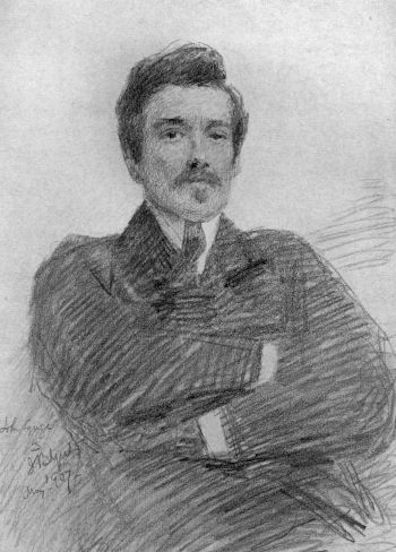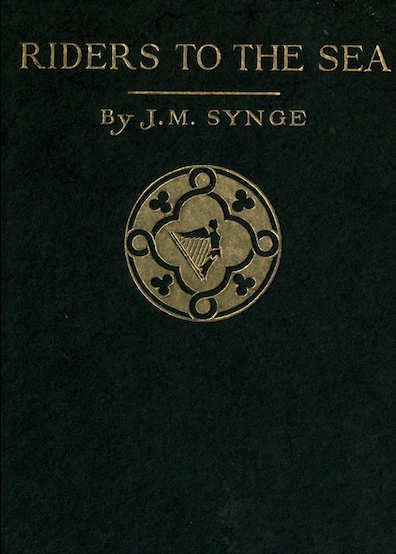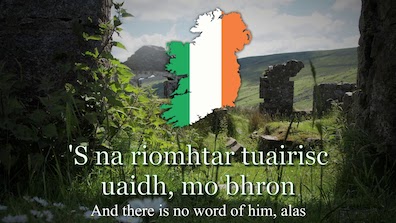§ Gifford
observes that "Synge created a [ahem!] singularly poetic and
dramatic language out of the peculiar combination of Irish
syntax and archaic English diction" that he heard spoken in
County Wicklow and the west of Ireland. His one-act play Riders
to the Sea was first performed in Dublin starting in
late February 1904. It is fair to suppose that when Joyce
penned Mulligan's mocking imitation of Irish speech he was
thinking primarily of Riders to the Sea and even
suggesting that Mulligan has attended a Dublin performance of
this play and has its lines ringing in his ears. The narrative
introduces his sentences by saying that he "keened in
a querulous brogue," and the play is all about keening.
Slightly later in Scylla, when Stephen invokes Thomas
Aquinas, Mulligan reprises his mourning ("he keened a
wailing rune") and repeats nearly verbatim what one of
the characters of Riders says as she begins to keen:
"It's destroyed we are from this day! It's destroyed we are
surely!"
Most English-speakers have some awareness of keening as a
high-pitched wailing lamentation for the dead, but they may
not recognize it as an ancient Irish practice or know that the
word is an Anglicization of the Irish verb caoin. Set
on one of the Aran Islands, in the Gaeltacht, Riders to the
Sea stages the story of Maurya, who has lost a husband
and five sons to the sea. Her daughters Cathleen and Nora
receive word that a body which may be that of their brother
Michael has washed up on the coast of Donegal. It does prove
to be Michael, and by the end of the play the sea also claims
Bartley, the one remaining son. All three broken-hearted women
keen their ruinous losses, which may well bring them to the
brink of starvation. By contrast, Mulligan's mournful wailing
is sparked by the fact that Stephen did not show up at the Ship to buy him drinks.
The word "querulous" means "complaining, peevish,
plaintive." One imagines Mulligan adopting one of his
old-woman voices, perhaps some variant of Mother Grogan's, to press
his countrified, wheedling, whining complaint.
§ The
word "brogue" is a familiar name for English spoken
with an Irish accent. But like "keen" it derives from an Irish
word: either bróg = shoe (a word that appears several times in Ulysses)
or barróg = speech defect. Dolan notes a
possible connection between the two, though this etymology is
contested: "There is a view that Irish people used to speak
English unintelligibly (as a result of linguistic
contamination from Irish syntax and vocabulary), and the
effect was as if they had a shoe on their tongue." When Joyce
writes in Finnegans Wake that HCE's "sbrogue cunneth
none lordmade undersiding," he seems to be playing with this
notion that thick-tongued Hiberno-English speech can be hard
to understand.
The brogue that flows from Mulligan's mouth is indeed hard to
understand in many particulars, though its general intention
is clear enough:
It's what I'm telling you,
mister honey, it's queer and sick we were,
Haines and myself, the time himself brought it in. 'Twas
murmur we did for a gallus potion would rouse a friar,
I'm thinking, and he limp with leching. And we one hour and
two hours and three hours in Connery's sitting civil waiting
for pints apiece.
He wailed:
— And we to be there, mavrone,
and you to be unbeknownst sending us your conglomerations the
way we to have our tongues out a yard long like the drouthy
clerics do be fainting for a pussful.
Stephen laughed.
§ The
passage paints a simple comic scene of Mulligan and Haines
sitting in the pub, painfully waiting for Stephen (as Synge's
women wait for news), and receiving only a telegram ("it"). The
syntax and verbal delivery echo Synge's representation of the
Aran islanders' lilting speech. Using a reflexive pronoun as a
subject, for example ("
himself brought it in"), is a
linguistic practice used often in the play ("Herself does be
saying prayers half through the night"), as is the insistent use
of "it" ("If it wasn’t found itself, that wind is raising the
sea, and there was a star up against the moon, and it rising in
the night. If it was a hundred horses, or a thousand horses you
had
itself, what is the price of a thousand horses
against a son where there is one son only?").
"
And we to be there" imitates the islanders' distinctive
use of conjunctions ("How would it be washed up, and we after
looking each day for nine days"). Another such idiom involving
"way" ("the way we can put the one flannel on the other") shows
up in Mulligan's "
the way we to have our tongues out." "
I'm
thinking" too recalls the speech of the play ("I’m
thinking it won't be long," "I'm thinking Bartley put it on him
in the morning"). Even Mulligan's counting of the hours ("
And
we one hour and two hours and three hours") echoes the
islanders' speech ("I’ll have half an hour to go down, and
you’ll see me coming again in two days, or in three days, or
maybe in four days if the wind is bad").
§ More such
echoes could be cited, but this note will highlight just one
other that is heard often in Irish speech. Commenting on the
churchmen that Mulligan says "
do be fainting" for a
drink, Slote cites P. W. Joyce: "In the Irish language (but not
in English) there is what is called the consuetudinal tense,
i.e. denoting habitual action or existence. It is a very
convenient tense, so much so that the Irish, feeling the want of
it in their English, have created one by use of the word
do
with
be: 'I do be at my lessons every evening from 8 to
9 o'clock'."
This kind of verbal construction is not completely absent from
the English spoken in England: there, people sometimes use the
future tense to imply habitual action, saying that boys will be
boys or clerics will be drinking. But the Irish way is much more
vivid. Many examples can be found in Synge's plays, including a
few in
Riders to the Sea: "the black hags that do be
flying on the sea," "In the big world the old people do be
leaving things after them for their sons and children, but in
this place it is the young men do be leaving things behind for
them that do be old." Characters speak in this way at several
other points in
Ulysses. In
Lestrygonians Nosey
Flynn tells the story of a woman who hid in a clock in the
Masons' hall to discover "what they
do be doing," and
Bloom imagines a constable pressing a servant girl with the
question, "And who is the gentleman
does be visiting
there?" In
Wandering Rocks Patsy Dignam thinks of "One
of them mots
that do be in the packets of fags Stoer
smokes."
While the syntactic rhythms of Mulligan's keening are clearly
derived from reading or listening to Synge, the vocabulary is
his own, and it far outdoes Synge for obscurity.
Riders to
the Sea employs no words more unfamiliar than "poteen"
(Irish moonshine) or "Samhain" (a pagan Gaelic fall festival).
Mulligan leads off with "
mister honey," which no
commentator has even directly addressed, much less
satisfactorily explained. In a personal communication, Senan
Molony argues that this must be a playful anglicization of some
Irish phrase. He offers one possibility:
más é do thoil é,
literally "if it is your will," or figuratively "if you please."
Spoken quickly, as this very long way of saying "please" must
be, "mar-shay-duh" would sound quite a bit like "mister,"
"hol-lay" could be twisted into "honey" with the change of one
consonant, and the meaning, "please," might conceivably advance
Mulligan's wheedling entreaty. The fit is admittedly loose, but
Molony's hypothesis is intriguing. Perhaps other Irish language
models will eventually be proposed.
The next two strange expressions appear to comically amplify the
beggars' thirst. Slote cites P. W. Joyce's observation that in
Hiberno-English, "particularly in Ulster, 'Queer and' is an
intensifier." Being "
queer and sick," then, means that
Mulligan and Haines were sick unto dying with thirst. The
OED
identifies "
gallus" as an obsolete form of "gallows."
The suggestion does not seem to be that the two men were longing
for a pint that deserved capital punishment, or for a deadly
one, or for one capable of promoting sexual excitement (Gifford,
responding to the mention of rousing a friar who is "limp with
leching," wildly surmises that the word evokes "the commonplace
that a man being hanged has an erection in the process"). Much
better, though certainly strange enough, is Slote's observation
that "gallows" too can be an intensifier. The
OED lists,
after all its other meanings, this one: "With intensive force:
Extremely, very, 'jolly'." A jolly big alcoholic potion, then.
In the next paragraph, "mavrone" is a common
Hiberno-English interjection borrowed from the Irish mo
bhrón, meaning literally "my sorrow" or "my regret."
Mulligan's keening here takes the form of "alas!"—no drinks
after all that time waiting. In "drouthy clerics," he
dips into obscure English once more. This is a Scottish
variant of "droughty," so the basic meaning is "dry, without
moisture, arid," but the OED lists a metaphorical
application: "thirsty; often = addicted to drinking."
Finally, the "pussful" of ale that the good fathers
and brothers do be wanting might possibly refer to their
faces, but more likely it echoes a slang use of "puss" for
"mouth." These meanings cannot be found in most dictionaries
of English written for English people, but The American
Heritage Dictionary, which reflects many usages brought
into American English by Irish immigrants, identifies both
slang uses: "1. The mouth. 2. The face. [Irish bus,
lip, mouth, from Old Irish, lip]." Dolan's Hiberno-English
dictionary translates "puss" only as mouth, and "shaping the
lips so as to make a pout; sulking." It cites a response to
such pouting: "Take that ugly sour puss off your face and get
on with the messages." Slote cites P. W. Joyce's relevant
observation that "puss" is "always used in dialect in an
offensive or contemptuous sense." Churchmen can never catch a
break from Mulligan.




